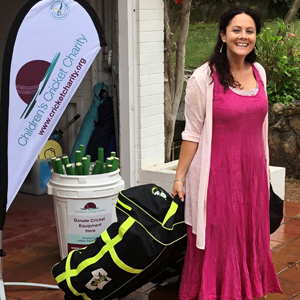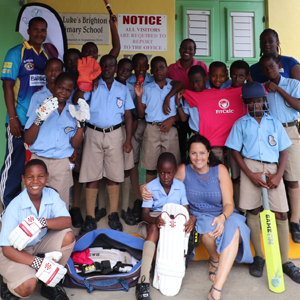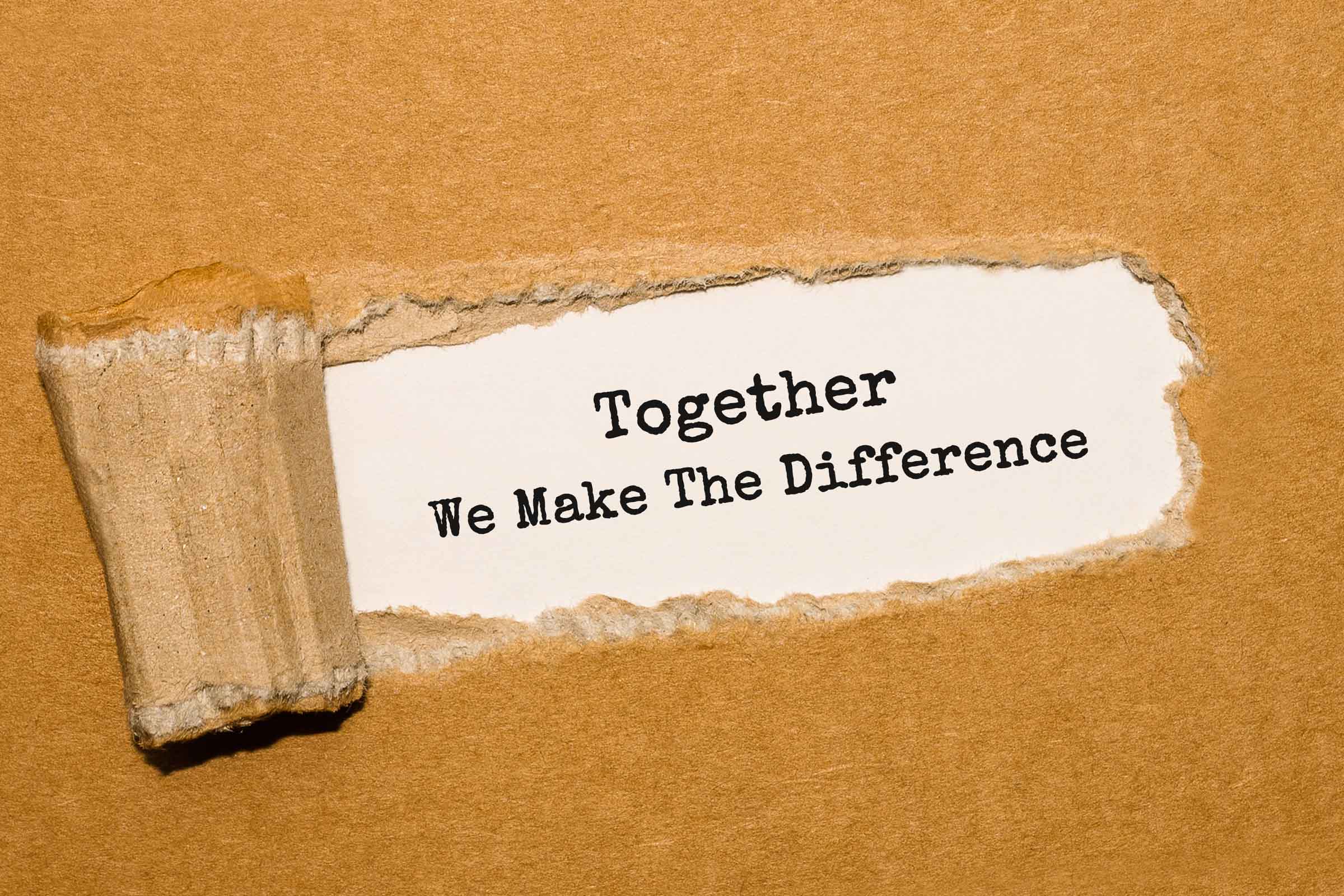Does a career with purpose appeal to you? We all want to make an impact through our day job. But if you’ve got a burning desire to make the world a better place, a not-for-profit career could be the right move for you.
The non-profit sector plays an important part in Australia’s economy. They are the largest provider of community services, making up nine per cent of Australia’s workforce.
In a not-for-profit career, you could promote cultural awareness and understanding, help struggling and developing nations, or work for a cause that’s close to your heart.
Insight sat down with Charles Sturt University alumnae Tamara Lowe to hear how her degree helped her believe in herself enough to change career and take the leap that led to her founding her own non-profit organisation – Children’s Cricket Charity.
 Why did you choose to study with Charles Sturt?
Why did you choose to study with Charles Sturt?
“I chose to study my bachelor’s degree at Charles Sturt University to further my understanding of complementary medicine and give me additional insights and knowledge for patients in clinical practice. The curriculum was fantastic, as was the online aspect. The teaching staff were always available for guidance and offered excellent tuition and advice throughout my degree.”
Tell us about how you became the founder of a non-profit organisation?
“I worked as a classical homeopath in Sydney for many years. And I completed a Bachelor of Health Science (Complementary Medicine) at Charles Sturt. The years spent establishing and running a busy homeopathy practice were wonderful. In 2015, I decided to channel my lifelong love for cricket into setting up the Children’s Cricket Charity.
“I was fortunate to embark on a family holiday through the Caribbean with my husband and two young boys. Everywhere we went, local children joined games of cricket with my sons using an inexpensive bat we were traveling with to play beach cricket. At a test match at Sabina Park in Kingston, Jamaica, towards the end of the trip, I asked a group of cricket-mad teenagers if anyone had ever owned a cricket bat or ball. Nobody had. When the test ended, I arranged for four cricket sets purchased from a local sports store to be delivered to the boys’ school in a low socioeconomic area of urban Kingston. A surprised principal happily accepted my gift for the students and the Children’s Cricket Charity was born!
“Upon returning to Sydney, I set up the charity and our Kit Recycling Program. I spent the following year writing to cricket clubs and schools. I asked them to circulate word that I was collecting outgrown cricket gear in good condition. Our Kit Recycling Program now collects new and used cricket equipment for redistribution. We receive donations from many schools, clubs and individuals, as well as Cricket NSW and Cricket Australia. We also have collection drop-off points at Kingsgrove Sports Stores throughout Sydney.”
What’s the key goal for your non-profit organisation?
“The charity is determined to give economically and physically disadvantaged children and teenagers the simple joy of access to cricket equipment and playing uniforms. Children’s Cricket Charity also ensures used cricket equipment outgrown by children and superseded new equipment unable to be sold commercially is diverted from becoming needless landfill.”
The Children’s Cricket Charity aims to relieve the spiral of poverty. It uses cricket as a vehicle for development and social change. In essence, we level the playing field. We provide cricket kit to needy communities so they can enjoy the many benefits of participation in sport.
What impact is your non-profit organisation having?
“In November 2018, the first of two 20-foot containers left Sydney for Antigua packed with cricket equipment. It will arrive for distribution in early 2019.
“In 2017, the Children’s Cricket Charity delivered cricket kit to two Caribbean nations: the twin island nation of Antigua and Barbuda, and Barbados.
“In total the following schools were identified as having little or no cricket equipment for students and they received much needed cricket equipment and playing uniforms: 26 primary schools, nine secondary schools, eight special needs units, and four college teams in New South Wales. Plus, in 2018, Children’s Cricket Charity equipment donations were also made to Sydney-based organisations. These included Community Care Refugee Program, Jesuit Social Services Backtrack Youth Works, and Tharawal Aboriginal Corporation. We continue to explore additional avenues for gifting organisations in NSW with cricket equipment for the children and teenagers they care for.”
What are some of your not-for-profit career highlights to date?
“Without a doubt my career highlights are the beautiful hugs from children. Plus, seeing their eyes light up when we present them with cricket gear to play a game they love! Speaking to grateful coaches and principals at schools and organisations we support is also incredibly gratifying. It makes all the hard work worth it!
“Other highlights include organising for retired West Indies cricketers who are wonderful Children’s Cricket Charity Ambassadors – Sir Richie Richardson, Ridley Jacobs, Desmond Haynes and Tino Best – to come along to Children’s Cricket Charity equipment donations in Antigua and Barbados last year. It was great seeing the children so captivated to meet their heroes!
“This year the Children’s Cricket Charity began facilitating positive social impact cricket coaching sessions as well. It’s took a lot of logistics but the outcome was incredible for everyone involved.”
What does it mean to you to be able to give back to the community?

“Being able to make the world a happier and healthier place for disadvantaged cricket-loving children and teenagers means the world to me. The Children’s Cricket Charity is on an epic mission of cricket kindness. It’s a quirky mission but one born out of a genuine heartfelt desire to bring joy to children through cricket.
“I try to inspire people blessed with the means to give to be generous in spirit for members of our community within Australia and the Caribbean who are in need.”
What inspires you in your not-for-profit career?
“Putting smiles on the faces of cricket-loving children living in poverty who received Children’s Cricket Charity equipment donations is my inspiration to continue. Being able to inspire children and teenagers to participate in a sport at the heart of both the Australian and Caribbean sporting cultures drives my work to collect bats, pads, gloves, helmets, balls and everything else that comes with playing cricket for children who through no fault of their own could never dream of having access to cricket gear.”
What advice would you give to someone who wants to make an impact in their community?
People can make an impact in their communities by taking action. If you see an area where you might be able to help others, try something crazy, big or ambitious. It can’t hurt and you never know – it might just change someone’s life for the better.
What skills, attributes and motivations does it take to become a change-maker?
“I think you need to dream big and work very hard. Establishing the Children’s Cricket Charity has taken perseverance in the face of adversity. I also think you need to be brave and think expansively. If you truly believe in what you stand for it is possible to leave a positive legacy behind. Don’t ever give up – it’s a big cliché but it’s true.”
“In my experience, a university degree can help you believe in yourself. Achieving the end point and attaining a degree is the result of time, effort and dedication to the quest for knowledge. I think these are valuable life lessons to learn, whether it is as a high school graduate or a mature age student, or anywhere in between.”
Any advice for someone who wants to start a not-for-profit career?
“Do it if you are passionate and prepared for endless hard work to make it happen. Plus, do as much background research as you can before setting things up. And be mindful that fundraising is a continual challenge.”
Ready to make a difference in your not-for-profit career?
If improving the lives of others, finding solutions to social issues and making the world a better place is a dream of yours, Charles Sturt University’s wide range of humanities, social work and human services degrees will take you there. Make a real contribution to society and find your purpose with an enriching career focused on human services.


You must be logged in to post a comment.